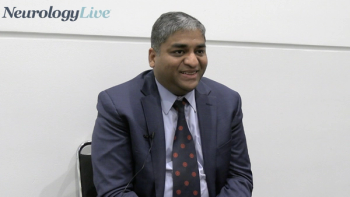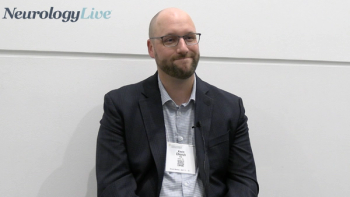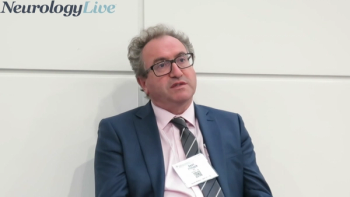
Test your neurology knowledge with NeurologyLive®'s weekly quiz series, featuring questions on a variety of clinical and historical neurology topics. This week's topic is on primary progressive aphasia.

Test your neurology knowledge with NeurologyLive®'s weekly quiz series, featuring questions on a variety of clinical and historical neurology topics. This week's topic is on primary progressive aphasia.

As part of our monthly clinician spotlight, NeurologyLive® highlighted movement disorder expert Kelly Papesh, DNP, APRN, FNP-BC, executive director of the Association of Movement Disorder Advanced Practice Providers.

In recent news, Lexeo Therapeutics' gene therapy candidate LX2006 received FDA fast track designation for patients with Friedreich ataxia cardiomyopathy.

Neurology News Network. for the week ending April 27, 2024. [WATCH TIME: 3 minutes]

Take 5 minutes to catch up on NeurologyLive®'s highlights from the week ending April 26, 2024.

The associate professor of neurology at Harvard Medical School discussed findings from a study investigating nasal foralumab in patients with non-active secondary progressive multiple sclerosis. [WATCH TIME: 5 minutes]

Stephen Samples, MD, chair of Allegheny Health Network’s department of neurology, gave commentary towards the AHS’s recent statement paper addressing CGRP-targeting therapies as a first-line option for preventive migraine.

The neuropsychologist and assistant professor of neurology at the University of California, San Francisco Memory and Aging Center provided comment on her presentation from AAN 2024 examining the association of area deprivation index with cognitive functioning in Black women. [WATCH TIME: 3 minutes]

Satralizumab, an IL-6 receptor inhibitor, shows promise in reducing infection rates compared to historical data.

In this conversation, Kremens discussed the common use of antiemetics in Parkinson disease, the real-world data surrounding these agents, and whether there are certain clinical advantages to apomorphine hydrochloride injection.

A recent study showed the relationship between genes associated with lysosomal function and environmental exposure to pesticides in Parkinson disease.

Daniel Kremens, MD, JD, provided commentary on a number of various amantadine formulations for Parkinson disease, and how timing of dosing impacts efficacy.

The full professor of chemistry at Vanderbilt University talked about research surrounding racial and ethnic disparities in Alzheimer disease incidence. [WATCH TIME: 5 minutes]

A case study of a 52-year-old Korean woman revealed the potential of Nanopore long-read sequencing in diagnosing atypical late-onset ataxia-telangiectasia.

Kenneth Ngo, MD, medical director for the Brain Injury Program at Brooks Rehabilitation’s 3 inpatient hospitals, highlighted how cotreatment between music therapy and physical therapy can significantly improve the overall quality of life for patients with Parkinson disease.

The chief scientific officer at Athira talked about the potential of hepatocyte growth factor compounds in promoting neurotrophic signaling and providing broad neuroprotection across neurodegenerative diseases. [WATCH TIME: 6 minutes]

The chair of neurology at Massachusetts General Hospital talked about results from the phase 2b PARADIGM trial assessing PrimeC, an ALS combination agent that consists of ciprofloxacin and celecoxib. [WATCH TIME: 4 minutes]

After 2 years of treatment, EDG-5506, otherwise known as sevasemten, was well-tolerated, with rapid and sustained decreases in biomarkers of muscle damage.

The head of neurosciences at the Jane and John Justin Neurosciences Center of Cook Children’s Medical Center provided commentary on the need to properly diagnose Lennox-Gastaut syndrome and the negative downstream impacts of misdiagnosis or underdiagnosing patients.

Lauren Seidman, a second-year medical student at NYU Langone’s Grossman School of Medicine, provided perspective on a poster at AAN 2024 highlighting the use of binocular visual function testing in Alzheimer disease.

Between those with NMOSD and NAION, the data showed differences in disc edema, peripapillary nerve fiber layer thickening, vision loss, and the symptoms that preceded vision loss.

The director of the Mayo Clinic Center for Multiple Sclerosis and Autoimmune Neurology discussed the safety of ravulizumab and the ways to avoid risks of meningococcal infection. [WATCH TIME: 3 minutes]

Using the Wechsler Adult Intelligence Scale Fourth Edition (WAIS-IV) Coding Test score, SAGE-718 failed to distinguish itself from placebo.

Foralumab's anti-CD3 mechanism modulates T cell function, offering potential benefits for the challenging-to-treat na-SPMS patients.

Mark Bain, MD, a neurosurgeon at Cleveland Clinic’s Cerebrovascular Center, provided commentary on the ENRICH trial, a positive study of minimally invasive removal of intracerebral hemorrhage.

The director of the MedStar Georgetown Headache Center talked about an intravenous migraine treatment that could offer long-term relief for most patients who respond well to the initial dose. [WATCH TIME: 5 minutes]

Here's some of what is coming soon to NeurologyLive® this week.

Larry Gifford, a patient living with Parkinson Disease and president of the PD Avengers, discussed sleep issues and nighttime symptoms faced by millions of patients with the disease worldwide.

Ofatumumab showed a consistent and long-term reduction in relapse rates and MRI lesion activity in patients with recently diagnosed, treatment-naïve relapsing multiple sclerosis.

The assistant professor of neurosurgery and biomedical informatics at the State University of New York at Buffalo talked about the efficacy and safety of using embolization as a promising treatment for subdural hematomas. [WATCH TIME: 3 minutes]